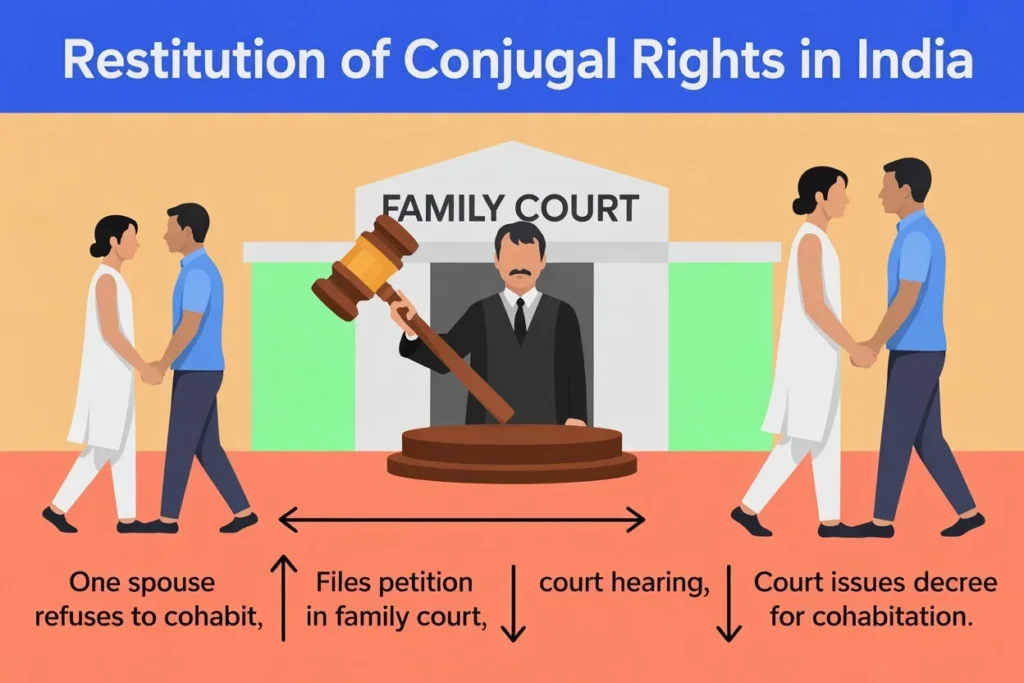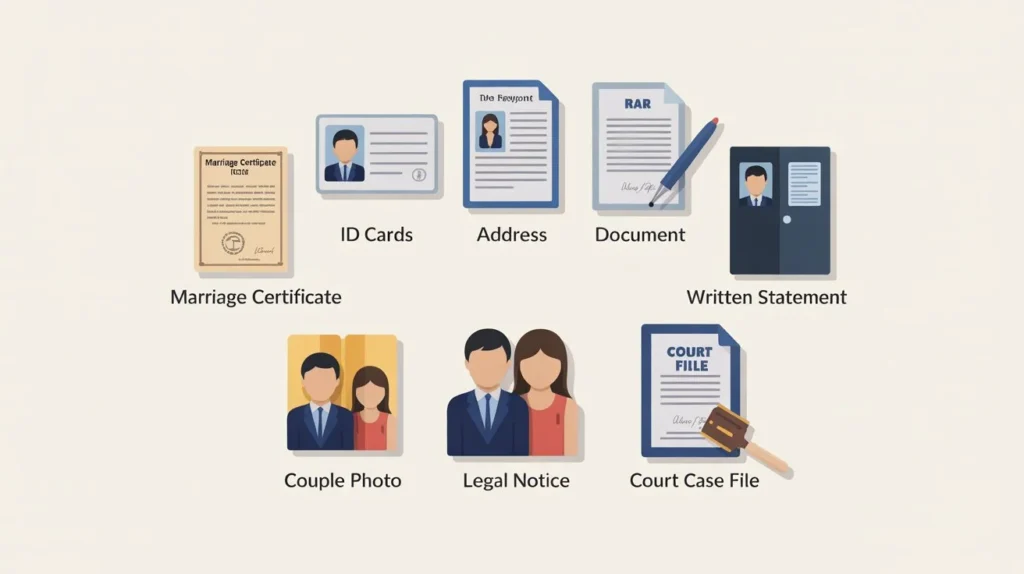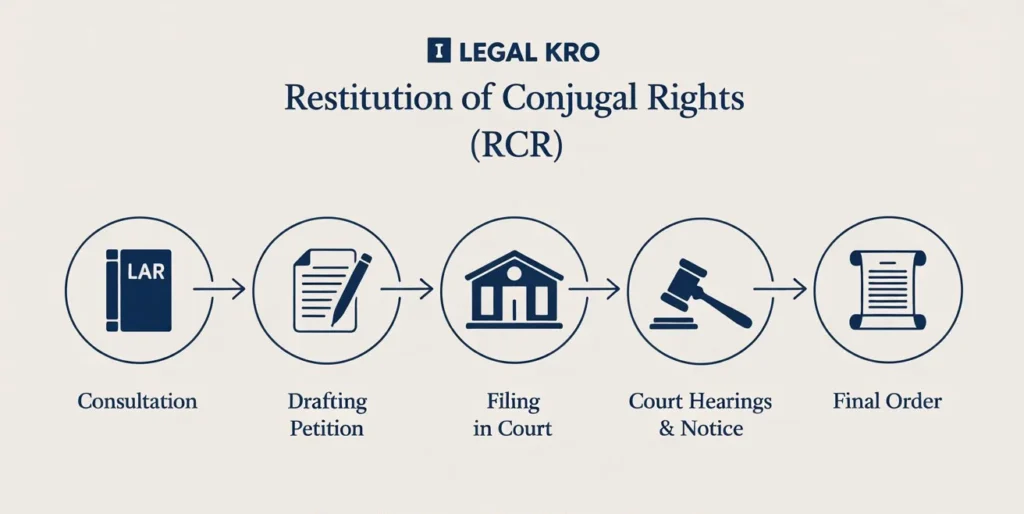Restitution of Conjugal Rights in India
-
Expert Legal Guidance | Section 9 Petitions Drafted by Professionals
-
Step-by-Step Assistance from Consultation to Final Court Decree
-
Confidential and Hassle-Free Process | Online and Offline Support
-
Affordable Legal Packages with No Hidden Charges
Marriage in India is not merely a social or emotional bond; it also serves as a legal contract. When one spouse withdraws from the other’s company without a valid reason, the aggrieved partner may seek legal recourse under the Restitution of Conjugal Rights (RCR) provision.
At Legal Kro, we assist clients in filing, defending, or resolving RCR petitions by providing expert legal advice, thereby ensuring that their marital rights are upheld under Indian law in a fair, respectful, and lawful manner.
Understanding the Concept of Restitution of Conjugal Rights in India
Restitution of conjugal rights is a legal term primarily related to marriage law. This concept traditionally offers a remedy for situations where one spouse, without reasonable excuse, withdraws from the companionship of the other. Essentially, the aggrieved party can approach the court, which may subsequently order the defaulting spouse to resume cohabitation and fulfill conjugal rights.
In this context, ‘conjugal rights’ encompass a broad spectrum of matrimonial obligations, including the rights to cohabit, provide companionship, affection, comfort, mutual services, and sexual relations. In India, the restitution of conjugal rights is notably addressed under Section 9 of the Hindu Marriage Act. This section establishes a specific framework for the aggrieved spouse to seek legal redress when the other spouse has unreasonably deserted them.
The legislation aims to protect the sanctity of marriage against unwarranted abandonment, thereby promoting reconciliation and harmony while upholding conjugal rights under the Hindu Marriage Act. In practice, this provision serves as an effective legal instrument, aiding spouses in resuming their duties and responsibilities while providing a mechanism for resolving marital discord.
What is Restitution of Conjugal Rights (RCR)?
According to Section 9 of the Restitution of Conjugal Rights of the Hindu Marriage Act of 1955, when either the husband or wife withdraws from the other’s social circle without justification, the aggrieved party may file a petition with the district court to have their marital rights reinstated. If the court determines that the claims presented in the petition are valid and that there is no legitimate defense, it may decree the restitution of conjugal rights.
What Are Conjugal Rights in India?
Conjugal rights refer to the right of spouses to remain together, which includes the freedom to engage in sexual relations. This is regarded as a marital privilege. Under Section 9 of the Hindu Marriage Act of 1955, it is unlawful for either spouse to exclude the other from their social circles without justification. The aggrieved party may petition the court to restore their conjugal rights.
The Underlying Principles of Restitution of Conjugal Rights
- Restitution of conjugal rights is founded on the marital duties and obligations that spouses owe to one another.
- No spouse possesses the authority to withdraw from the marriage unilaterally without a justified reason.
- The aggrieved spouse has the right to file a legal petition for restitution if the other partner withdraws.
- Marriage is regarded as a mutual contract of companionship.
- The objective of this remedy is to prevent the breakdown of marriage and to promote reconciliation.
- It supports the spouse who is willing to cohabit but has been unlawfully denied companionship.
Applying for Restitution of Conjugal Rights: The Process
- The process commences when one spouse refuses to cohabit without reasonable justification.
- The aggrieved party submits a petition in family court seeking restitution.
- The petitioner is required to demonstrate that there is no valid reason for the spouse’s withdrawal.
- If the court is satisfied, it may issue a decree legally mandating the other spouse to resume cohabitation.
- This process serves as a reminder for both parties of their marital responsibilities.
- It aims to preserve the marital bond by re-establishing shared living arrangements.
The Role of Courts in Restitution of Conjugal Rights Cases
- District and High Courts are tasked with adjudicating these matters.
- The courts strive to reconcile spouses while ensuring that dignity and fundamental rights are upheld.
- Judges evaluate the motivations and circumstances surrounding each party.
- The courts determine whether the withdrawal from marriage was “reasonable.”
- High courts also function as appellate bodies and custodians of constitutional rights.
- They ensure that the provision is not misused or applied in a manner that violates privacy and autonomy.
Impact of Restitution of Conjugal Rights on Marriage
Positive Aspects:
- Encourages reconciliation as an alternative to divorce.
- Ensures that spouses do not abandon their marital obligations without valid justification.
- May serve as a deterrent against abrupt separation.
Negative Aspects:
- Can infringe upon individual autonomy and the right to privacy.
- Critics perceive it as judicial coercion into unwanted cohabitation.
- May intensify existing tensions rather than resolve them.
Criticism and Controversy Surrounding Restitution of Conjugal Rights
- It is viewed as a mechanism to compel unwilling spouses to return to marriage.
- This approach may exacerbate conflict instead of facilitating resolution.
- Critics raise ethical concerns regarding the compulsion of cohabitation or sexual relations.
- It is regarded as a violation of personal freedom and bodily autonomy.
- The discourse revolves around the preservation of marriage versus the respect for individual rights.
Restitution of Conjugal Rights: Comparative Study Across Countries
- India: Recognized under the Hindu Marriage Act of 1955, the Special Marriage Act of 1954, and the Indian Divorce Act of 1869. This concept applies across religions through respective personal laws or secular laws.
- United Kingdom: Abolished under the Matrimonial Causes Act of 1973.
- Scotland: Declared unilateral claims for sexual access to be an anachronism as early as 1984.
- Global View: Many countries regard the concept as outdated and incompatible with contemporary values of consent and autonomy.
Alternatives to Restitution of Conjugal Rights
- Judicial Separation: Legal authorization for spouses to live separately while remaining married.
- Mediation and Counseling: Promote voluntary reconciliation rather than legal enforcement.
- In the case of T. Sareetha vs. T. Venkatasubbaiah (1983), the Andhra Pradesh High Court ruled Section 9 of the Hindu Marriage Act unconstitutional, citing violations of privacy.
- Encourages non-coercive methods such as therapy and relationship counseling.
- Supports respect for autonomy while maintaining efforts to preserve the marriage.
Effects and Implications of Non-Compliance with a Restitution of Conjugal Rights Order
- Contempt of Court: May result in fines or imprisonment if the order is willfully disregarded.
- Grounds for Divorce: Non-compliance after one year constitutes valid grounds for legal separation.
- Emotional Impact: May lead to psychological distress for both parties.
- Legal Ramifications: Continued refusal is taken seriously by the courts.
This emphasizes the necessity of honoring court orders and fulfilling marital responsibilities.
When Can You File a Restitution of Conjugal Rights (RCR) Petition?
An RCR petition may be filed under the following circumstances:
– Your spouse has left the marital home or is refusing to cohabit.
– There is no reasonable or lawful justification for the separation.
– You wish to preserve the marriage and live together.
– There is no ongoing mutual consent divorce or irretrievable breakdown.
Please Note: This petition is not applicable in cases of domestic violence, abuse, or cruelty.
How Can the Court Refuse to Grant an Order of Restitution of Conjugal Rights (RCR)?
A wife may seek the restoration of her marital rights if the husband deserts her or fails to fulfill their contractual obligations without justification. Similarly, a husband may request the return of his wife’s conjugal privileges. However, the court may refuse to issue a decree restoring marital rights for the following reasons:
– Harshness exhibited by the husband or in-laws.
– The husband’s failure to fulfill his commitments to the marriage.
– The husband’s failure to pay a prompt dower.
Documents Required to File an RCR Petition
To file an RCR petition, the following documents are typically required:
– Marriage Certificate or proof of marriage.
– Identification proof of both spouses (Aadhaar, PAN, Passport).
– Address proof (Utility bill, rental agreement, etc.).
– A detailed statement of separation and withdrawal.
– Photographs or other evidence of marital cohabitation.
– Any prior legal notices or communications.
– Copies of any existing court cases involving the parties.
Legal Kro assists you in preparing and filing all necessary paperwork efficiently.
Legal Process for Filing Restitution of Conjugal Rights with Legal Kro
Step 1: Consultation with Family Law Expert
We will evaluate your marital situation and determine if pursuing an RCR is the appropriate legal action for you.
Step 2: Drafting the Petition
Our attorneys will draft a comprehensive petition under Section 9 or relevant law, detailing the facts, circumstances of separation, and the request for restoration.
Step 3: Filing in Family Court
We will file your petition in the appropriate Family Court and secure a hearing date.
Step 4: Court Hearings & Notice to Respondent
The other spouse will be served notice and given an opportunity to respond. The court may initially seek reconciliation.
Step 5: Final Order
If no valid objections are presented, the court may issue a decree directing your spouse to resume cohabitation.
What Happens After an RCR Decree?
- If your spouse complies, marital cohabitation will resume.
- If your spouse refuses to comply, you may subsequently file for divorce on the grounds of desertion.
- The decree may impact child custody, property rights, and alimony claims.
- It serves as a legal record of the attempted reconciliation, which may be pertinent in future proceedings.
Can an RCR Be Challenged?
Yes. The spouse receiving the RCR notice can challenge the petition on grounds such as:
– Cruelty or abuse.
– Forced marriage.
– Religious conversion.
– Mental illness or incompatibility.
– Loss of trust or irretrievable breakdown of the marriage.
Legal Kro provides assistance to both petitioners and respondents in RCR matters.
FAQs
Yes, it is recognized under Section 9 of the Hindu Marriage Act and other personal laws.
Yes, either spouse husband or the wife has the right to file the petition.
It may serve as grounds for filing for divorce on the basis of desertion after a period of one year of non-compliance.
Yes, however, it is contingent upon mutual consent and respect. Coerced intimacy is illegal and may be classified as marital rape under certain interpretations.
Yes, a petition may be withdrawn if both parties reach a reconciliation or if one party no longer wishes to pursue the matter.




